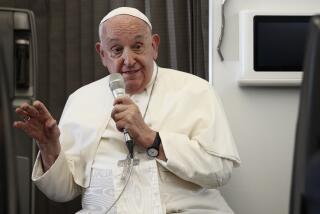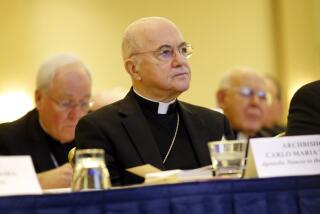Francis, a New World pope, is Old World in church dogma
For the first time in history, the Roman Catholic Church has a pope from the New World, but liberal American Catholics should not expect Pope Francis to stray far from the old theology. Some things are excitingly different about this new pontiff. On matters of birth control, abortion, homosexuality, celibate priests and the role of women in the church, however, he is no revolutionary.
When Argentina’s Cardinal Jorge Mario Bergoglio stepped out on the Vatican balcony as the new pope on Wednesday evening, all he was required to do was wave and give a blessing. Instead, he began with a witty reference to the fact his fellow cardinals had picked someone from the far side of the planet to become bishop of Rome. Then, before giving his own blessing to the city and the world — “urbi et orbi” — he asked the multitude in St. Peter’s Square to bless him. His humor, humility and kindly smile immediately endeared him to the faithful and marked a contrast will his chillier German predecessor, Benedict XVI.
In Latin America, the conclave’s choice was met with wild enthusiasm because he is one of their own. Picking the first non-European pope in more than 1,200 years was a timely decision given that the majority of Catholics are no longer European. Almost half live in Latin America, and Africa is where the church is experiencing the most dramatic growth.
There is great hope among those who admire the social teachings of the church that Pope Francis will put the struggles and needs of the poor in the developing world at the top of his public agenda. In Argentina, he is known as a man of the people who shunned the limousines and palaces enjoyed by past cardinals and, instead, rode public transit and lived in a modest apartment where he cooked his own meals. He has been a critic of the corrupt politics and greedy economic policies of the powerful and rich. If he puts the authority of the Roman Catholic Church on the side of exploited workers and the destitute in the barrios, Francis could have a significant humanizing influence on the world economic order.
Much has already been made of the fact he chose Francis as his pontifical name, another first in the long line of popes. The assumption is he wanted to take on the name of St. Francis of Assisi, the favorite saint of the poor and marginalized. This, too, would be a good sign, a very clear assertion of where his priorities will lie.
It is entirely possible that, as the first Jesuit to be elected pope, he also had in mind another Francis – St. Francis Xavier, who, with St. Ignatius Loyola, founded the Jesuit order in the 16th century. Xavier began the bold missionary tradition of the Jesuits, traveling to India, Southeast Asia and Japan, before he died at the age of 46 while waiting for permission to enter China.
The evangelizing work of Xavier could be a model for Pope Francis. During Benedict’s years as pope, selling the message of the church became a priority to counteract the rise of secularism in the West and the sharp drop in the number of parishioners, priests and nuns in Europe and the United States. Francis will almost certainly carry on this work and, because of his humility and social concern, will probably be a better salesman than his predecessor.
Still, Francis will not be selling a new product. On theological issues, the new pope’s pronouncements during his years leading the church in Buenos Aires were entirely tradtional.
The fresh image he projected in his first moments on that Vatican balcony was appealing. Still as he raised his hand to the rain-soaked crowd, he was backed by a phalanx of old, conservative, white men in red cardinals’ robes. It should not be forgotten that, only minutes before, Francis was one of them.
More to Read
A cure for the common opinion
Get thought-provoking perspectives with our weekly newsletter.
You may occasionally receive promotional content from the Los Angeles Times.











